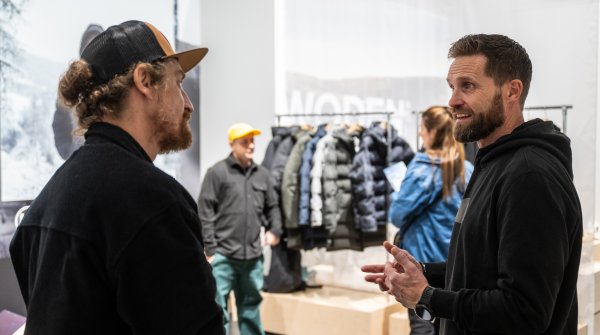Workation, i.e. work and vacation in one, is on everyone's lips. Work from the beach, calls during a mountain hike - workations make it possible. Thanks to the home office boom during the Corona pandemic, it's no longer just the self-employed, freelancers and digital nomads who have discovered the wide world as an open-plan office.
This is not the turbo-capitalist nightmare of constant availability on vacation, packaged in a new, cynical buzzword. On the contrary: workstations don't saddle people with work on a vacation day, but make it possible to be on vacation on a workday.
As Sarah Siddle, public relations and marketing manager at travel provider Holidu puts it, "A workation is the perfect way to spend an extended period of time at a destination of your choice without being subject to annual leave limitations." Vacation blackouts? City breaks only on long weekends to save vacation days? This is where workations bring new flexibility. Instead of slumping on the sofa at home in familiar surroundings after the workday, new impressions and encounters beckon.
The concept is catching on. According to Expedia's 2020 "Work from Here" study, 74 percent of employees in the U.S. who worked remotely wished they could work at a vacation destination for a change of scenery. In Germany, the figure was as high as 49 percent of home office employees.
In the "Travel Trends 2021" study by the strategy and marketing consultancy Simon-Kucher & Partners, 42 percent of Germans were open to taking up workation in the near future.
It's no wonder that the ability to work from anywhere is becoming a factor in the choice of employer, especially among young professionals. Among the respondents to a study of professionals conducted by the specialist portal Workation.de, 62 percent stated that the decisive factor for them when choosing a job was whether the employer offered workstations.
According to the survey, 51 percent of respondents preferred an employer who offered workation in the employment contract; in contrast, only 38 percent would prefer a higher salary.
Companies are responding: More and more global players such as Airbnb, SAP and Deloitte now offer their employees the option of working from anywhere. Vodafone Europe allows 20 working days a year from any EU country.
Satya Nadella, CEO of Microsoft, said of the changing job market, "In the past year, no area has changed as fast as the way we work. Employee expectations are changing and we need to define productivity much more broadly - including collaboration, learning and wellbeing. Flexibility in when, where and how people work is important."
In addition to their attractiveness as an employer in the race for the best talents, workstations with new ideas and networking opportunities off the beaten track bring further advantages for companies. And: coordinated workations can provide more momentum and cohesion as team events.
"Whether in a coworking space, as a team vacation, or in newly formed groups, workations are primarily about community, networking, and exchange," says Veronika Engel from the location marketing department for the district of Miesbach, where she oversees the CoworkationALPS association, among others.
However, there are pitfalls for employees and companies: Coordinated workation programs require a great deal of planning. Are electrical outlets available on site? Are adapters necessary? Is there a stable Internet connection and VPN? Or does it already fail at a desk?
In order to avoid frustration on both sides, it is also important to clarify the working methods in advance: When is working time, what is vacation time? Which calls and meetings are obligatory and how can escalation and feedback loops run as smoothly and time-savingly as possible, especially between different time zones? The answers to these questions ultimately determine whether the concept of workation really works in individual cases, or whether it derails into the extremes of inefficiency or non-stop working day. When there are multiple workation requests, it is therefore worthwhile to have standardized processes and uniform rules.
And: workstations are a privilege that is by no means granted to everyone. In skilled trades, production or service professions, there is usually no way around the obligation to be present. And for employees with children or people in need of care, workstations are often an impossibility. Managers in companies that offer work-at-home programs should offer these stay-at-home employees compensation options to prevent conflicts.
Not to mention tax and social security issues: While, for example, EU citizens within the EU can be largely flexible for short-term work assignments, the social security status in non-EU territories depends on agreements between the individual states.
For longer-term workation plans, a supplementary agreement to the employment contract should not be shied away from. But: In the case of a permanent stay abroad, even that may no longer be sufficient. Where workation ends and home office with residence abroad begins, and what legal requirements the respective status entails, often varies from state to state.
It's no wonder that medium-sized companies in particular take the precaution of following the motto "If you don't do anything, you don't do anything wrong" and don't even allow workations or remote work abroad. Others, such as Elon "They should pretend to work somewhere else" Musk, don't think much of remote work on principle. In view of the above study results, this is a competitive disadvantage.
At least: improvement is in sight. The popularity of workstations is increasingly setting precedents around the world, according to human resources services provider Haufe. Accordingly, legal guard rails can be expected soon.
In addition, numerous tourism providers and regions have now prepared for the workation run and offer accommodations and co-working spaces that meet all work and vacation requirements.
CoworkationALPS, for example, offers 22 coworking locations in Bavaria, Austria and Italy, hitting a nerve. "Rural areas with the opportunity to spend time in nature are especially in demand," says Jurriën Dikken of the European Tourism Institute (ETI).
It's also an opportunity away from the peak season for hotel and inn owners who were battered during the Corona years. "Tourism providers rival each other for a limited time budget per year. Coworkation is basically a '365-day thing' - so the market potential arises mathematically alone," says Georg Gasteiger, owner of Mesnerhof-C in Tyrol, who also offers his farm for workation stays as a member of CoworkationALPS.
Iceland offers those interested in Workation the opportunity to work remotely on the island nation for up to 180 days a year without major bureaucratic hurdles. The Emirate Ras Al Khaimah in the United Arab Emirates issues workation visas valid for up to twelve months and offers discounts for long-term hotel stays and rental cars.
The international travel provider Holidu has compiled a ranking of the best workation destinations according to criteria such as remote working conditions, the number of co-working spaces and cost of living.
Two Asian cities, Bangkok and New Delhi, are at the top of the list. Followed by the southern European co-working havens of Lisbon and Barcelona. "All of the cities that made it to the top spots did so primarily because of their very affordable cost of living, with extremely attractive prices for accommodation, food and beverages," Siddle said. "In addition, these cities are cultural hotspots in their own right, all offering a range of impressive attractions and activities."
Top 10: The most attractive cities for workations, according to the Holidu study:
- Bangkok, Thailand
- New Delhi, India
- Lisbon, Portugal
- Barcelona, Spain
- Buenos Aires, Argentina
- Budapest, Hungary
- Mumbai, India
- Istanbul, Turkey
- Bucharest, Romania
- Phuket, Thailand
Whether it's on an idyllic alpine farm or in a co-working skyscraper, workation is here to stay. Airbnb CEO Brian Chesky is certain that remote working and flexible work locations "will be the preferred way we work in ten years."
But for both globetrotters and stay-at-homes to benefit, there's still a lot of work to be done by executives, HR departments, policymakers, and the courts.
- ISPO awards
- Mountain sports
- Bike
- Design
- Retail
- Fitness
- Health
- ISPO Job Market
- ISPO Munich
- ISPO Shanghai
- Running
- Brands
- Sustainability
- Olympia
- OutDoor
- Promotion
- Sports Business
- ISPO Textrends
- Triathlon
- Water sports
- Winter sports
- eSports
- SportsTech
- OutDoor by ISPO
- Heroes
- Transformation
- Sport Fashion
- Urban Culture
- Challenges of a CEO
- Trade fairs
- Sports
- Find the Balance
- Product reviews
- Newsletter Exclusive Area
- Magazine







